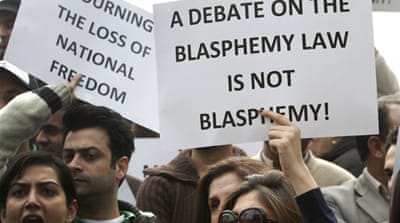M WAQAR..... "A man's ethical behavior should be based effectually on sympathy, education, and social ties; no religious basis is necessary.Man would indeed be in a poor way if he had to be restrained by fear of punishment and hope of reward after death." --Albert Einstein !!! NEWS,ARTICLES,EDITORIALS,MUSIC... Ze chi pe mayeen yum da agha pukhtunistan de.....(Liberal,Progressive,Secular World.)''Secularism is not against religion; it is the message of humanity.'' تل ده وی پثتونستآن
Tuesday, March 10, 2015
Pakistan's blasphemy law - Crime Or Terrorism
The Islamabad High Court on Monday upheld the conviction of Mumtaz Qadri – the murderer of former Punjab Governor Salman Taseer – under section 302 of the Pakistan Penal Code (PPC) and declared the conviction under the Anti-Terrorism Act as null and void. What this means is that the judges agree that Qadri unlawfully killed Taseer, which is why they’ve upheld the death sentence, but they do not view the murder as an act of terrorism. This has at least one clear implication. The death sentence under the PPC is compoundable unlike under ATA, which means that the family is allowed to pardon the culprit. The court has done no favours to Taseer’s family by putting them in a position where they may be blackmailed and pressurised to strike a bargain. Regardless, they shouldn’t have any power to decide Qadri’s fate. Only the direct victim should have the right to forgive, and in his regrettable absence, the killer cannot be allowed to escape punishment under any circumstances.
It appears that the IHC considered more than just law to decide the outcome of the case. It is rather disappointing that a man being shot 32 times in broad daylight by a lunatic in the name of religion doesn’t qualify as terrorism in the infinite wisdom of the honourable judges. Did they not find evidence of people being terrorised by Qadri’s actions? Some context may prove helpful. Salman Taseer was killed for raising his voice against the misuse of blasphemy laws. It is extremely difficult for everyone in Pakistan, be it a common man or a sitting governor or the entire parliament, to remove, revise or even discuss the controversial blasphemy laws. Why is that? Is it because of lack of sound arguments? Is it because there is a consensus over such laws? How is it that despite so many victims and varying opinions, there is no debate in the parliament or the mainstream media? It is primarily because of fear that stems for the very real threat of violence by zealots like Qadri and other religious personalities and groups that justify Taseer’s murder. Salman Taseer overcame fear, ignored threats and spoke up, hoping to secure justice for a hapless Christian woman. What did Qadri do in response? He shot him dead, shutting the debate before it could start, instilling fear in those who share Taseer’s views. The message was clear for everyone: shut up or get killed. Blasphemy laws are not protected by reasoning or common sense. More than anything, they are shielded by fear and terror. Any action, which serves to reinforce fear and sustain terror, ought to be regarded as an act of terrorism. Is that not what happened here? Who would dare to hold another press conference for a victim of blasphemy laws? Why would it be a daring act bordering on suicide? There’s your answer.
Subscribe to:
Post Comments (Atom)


No comments:
Post a Comment